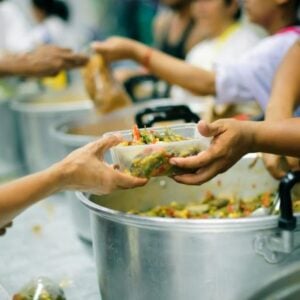The UN World Food Programme (WFP) has welcomed commitments from more than 40 governments made over the past two years to expand national school meal programmes, bringing the world closer to the goal of ensuring every child receives a nutritious meal at school by 2030. As the host of the School Meals Coalition Secretariat and lead UN agency supporting governments, WFP works to help countries build sustainable school meal programmes, strengthen food systems, improve children’s nutrition, and invest in future generations.
The 2nd School Meals Coalition Global Summit, held under the high patronage of His Excellency Luiz Inácio Lula da Silva, President of Brazil, and co-chaired by France and Finland, highlighted the rapid growth of the Coalition. Launched in response to COVID-19 disruptions, the Coalition has become one of the fastest-growing multilateral platforms, now counting 111 governments and around 150 partners, including 19 new governments, four regional bodies, and 46 partners joining in the past two years.
Vice-President of Brazil, Geraldo Alckmin, emphasized at the Summit that well-fed children are healthier and better able to learn, stating, “There is no better choice than choosing children, education and health through school meals.” According to WFP’s State of School Feeding Worldwide report, at least 466 million children now receive school meals through government-led programmes, an increase of 80 million, or 20%, over the past four years. Two-thirds of children who began receiving school meals between 2022 and 2024 are in Coalition member countries, demonstrating the Coalition’s role in accelerating progress.
New commitments from over 40 countries, particularly low- and lower-middle-income nations, are expected to expand access further, reflecting recognition of school meals as a high-impact investment in children’s health, education, and national development. Around 50 governments shared Voluntary National Reviews at the Summit, highlighting progress, challenges, and support needs, and underscoring accountability and achievements.
Cindy McCain, WFP Executive Director, emphasized that school meals are more than food—they provide access to education for vulnerable children and transform national education, health, and food systems. WFP’s Secretariat role is to help governments translate political will into sustainable programmes.
The Summit showcased evidence-based policy guidance, with the Coalition’s Research Consortium presenting findings that school meals deliver some of the highest returns in human capital. The Sustainable Financing Initiative now moves from strategy development to active support for governments, while updated data tools like the State of School Feeding Worldwide report and the Coalition Global Database provide accessible national-level information for governments, researchers, and partners. The School Meals Civil Society Organizations Steering Group and Network also endorsed a new set of Joint Commitments for the next two to three years.
Carmen Burbano, WFP Director of School Meals and Social Protection, noted that the Coalition, built by governments during the largest hunger and education crisis in history, has become one of the strongest multilateral movements of the past four years, demonstrating the power of collective action. Governments and partners now aim to turn commitments into action, scaling nationally led programmes, securing sustainable financing, and integrating school meals into education, health, and food system policies.
Looking ahead, the Coalition targets reaching 150 million more children by 2030, in alignment with the Global Alliance Against Hunger and Poverty. WFP, as Secretariat, will continue supporting governments with data, technical expertise, and evidence to launch, scale, and sustain programmes, reducing reliance on aid while ensuring that every child receives a healthy, nutritious meal. WFP expressed gratitude to the Government of Brazil for hosting the Summit and to the co-chairs, France and Finland, for their leadership in driving inclusive, government-led progress.






